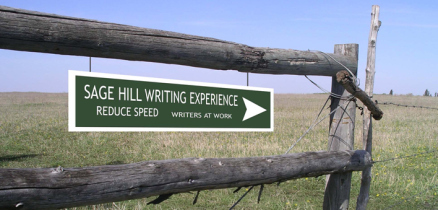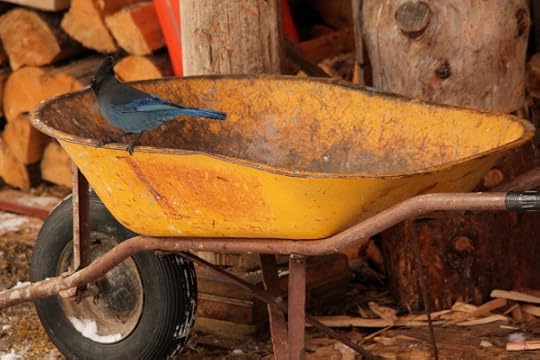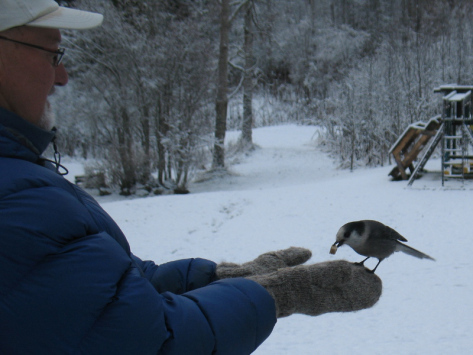Sheila Peters's Blog, page 9
May 4, 2016
On folding a rowboat
My chapbook of poetry – The Bathymetry of Lax Kwaxl – is being launched, quite literally, into the Bulkley River this coming weekend – the day before Mother’s Day by chance. We are going to fold the poems into boats and send them down on their way to Prince Rupert. As we made plans for the launch I remembered this piece I wrote many years ago to honour my mother, who still lives beside the beach where we gather to swim – she’s coming up to 92 years old. “On Folding a Rowboat” was published in a Prince Rupert anthology called North Coast Collected (thanks to Jean Rysstad for choosing it) in the early 1990s.
 I sat at my kitchen table laboriously folding an origami rowboat. I had bought a book demonstrating the nautical equivalent of the art of folding paper airplanes. Ostensibly for my children, the book was really for me. I love following the instructions, figuring out the folds and angles, producing a perfectly engineered ship from a leftover scrap of paper.
I sat at my kitchen table laboriously folding an origami rowboat. I had bought a book demonstrating the nautical equivalent of the art of folding paper airplanes. Ostensibly for my children, the book was really for me. I love following the instructions, figuring out the folds and angles, producing a perfectly engineered ship from a leftover scrap of paper.
I needed an excuse, however. A Mother’s Day present lay waiting to be wrapped, and I decided to decorate it with paper boats. So, naturally, I started thinking about water, my mother, and – inevitably – swimming.
I was a child and the sea was home to my body. Its salt supported me as I thrashed my way to buoyancy; it cleansed my scrapes and cuts; it washed illness away. My mom never took us to the beach and said, “Now, don’t get wet.” Yes, I have seen this, have heard parents tell their children they can’t go swimming because they have a cold. Or it wasn’t warm enough.
Why were they there, I wondered, if not to swim? To torment their children? I was an adult before I understood that people go to the beach for reasons other than swimming.
My family firmly believed that swimming in the ocean, even in cool water, was a tonic; refreshing and curative. It would certainly never cause any harm.
believed that swimming in the ocean, even in cool water, was a tonic; refreshing and curative. It would certainly never cause any harm.
Perhaps I should clarify here that it was my mom’s family, weaned on North Sea beaches, that made the summer evening trips down the terraced streets of Powell River to the beach. Since we lived farthest away, my mom would begin the walk with just the three of us kids in tow. On the way down towards the water we would pick up Granny, and sometimes Grandpa, and then join our aunt and her three children at the beach just below her house. But the sons-in-law, men who worked outside on log booms summer and winter, day shift and night shift, were intent on keeping their bodies out of the salt chuck; it would take more than a warm, idle summer evening to re-route those neural paths.
Unnecessary modesty was scorned on these outings. We changed behind boulders or the massive roots of beached cedars, struggling to pull clothes over damp salty skin before a shielding towel fell or was blown away. My grandfather would change beneath a towel even at the most public beach on a Saturday afternoon. One summer, while his wife was back in Scotland, my mom had to force him to buy a new bathing suit; his old one was so full of holes it was no longer decent. In his late seventies at that time, thin, wrinkled, and almost blind, he appeared the next day in brilliant blue satin trunks, their cut clearly intended for young hunks. It was, I think, his last bathing suit.
As I grew and was exposed to a wider array of summer social activities, I was astonished to discover that many people didn’t like to swim at all, and of those who did, most preferred lakes. As wealth grew, swimming pools.
As for myself, I have never trusted fresh water. Not even swimming pools. The sight of small children toddling along the slippery tiles, a stumble away from eight or ten unforgiving feet of bleached water, makes me cringe. What will happen if I leave before their sundazed parents wake up? Or if the lifeguard is distracted by a teenage commotion?
But watching children play beside the ocean is as comforting as seeing t hem curled up, dozing in the sun against salty women’s skin.
hem curled up, dozing in the sun against salty women’s skin.
The beach at the bottom of Third Avenue where we used to swim was protected and benign. I could not fall in off the edge; at high tide there were no sudden drops, just enough slope so the water got comfortably deep before I was too far away from my mom for reassurance. The ocean could not carry me off because each wave pushed me back to shore. Its secrets were revealed at every tide’s ebb, its furtive crabs and limp slippery weeds, its smooth stones and gravel washed twice daily, as orderly as my own ablutions.
There were no rip tides, no undercurrents, just waves, logs to ride and dive from, and buoyant salt cradling young bodies. It seemed to me the only people the ocean claimed were those foolish enough to go too far from shore, and then what could you expect? Storms, too much drink, holes in boats, these killed people. Not swimming.
Because we live so far from the ocean now, and my need for immersion is so strong, my children learned to swim in lakes. But growing comfortable with lakes has taken me years. There were oceans for swimming and puddles for puddling. On the clearest calmest day the ocean never reflected anything but fractured light. Lakes, being fresh water, were closer, in my family’s pantheon, to puddles. Not entirely clean and reflecting a different kind of light. A child peering in, wonders how deep is this puddle, are my rubber boots tall enough or will the water rise to slip over the rims? Then seeing the whole sky waiting in that calm reflection, the depth unimaginable, the child teeters terrified at the edge while feeling that pull down, down into the sky.
 Haslam Lake, one of the lakes of my childhood, was like that. Still, limpid water reflected trees that crept right up and hung over its edges.
Haslam Lake, one of the lakes of my childhood, was like that. Still, limpid water reflected trees that crept right up and hung over its edges.
As for unclean, well, it’s not really fair to call Haslam Lake dirty – it supplied much of the town with wonderful drinking water. But when I was younger and still afraid of lakes, its squishy bottom, sludged stones, and logs dead beneath the accumulation of eons sent a ripple of distaste up my spine. Like cold, greasy cutlery at the bottom of a sink full of forgotten dishwater.
To avoid the ooze, we’d swim at a gravelly patch of shoreline resembling the seashore at high tide. And here the lake revealed its true nature; it was a cheap trick, a watery imitation lacking substance and buoyancy. Floating took effort; concentration wavered into floundering panic. All confidence in my fledgling dog paddle dissolved in flailing, sputtering indignity. Because of this, I disliked lakes. As well as muddy, tangled with weeds, hiding leeches of legendary awfulness, they were mean-spirited and dangerous.
Sometimes my mom took us to Haslam Lake fishing – not often, but once or twice. We’d rent a rowboat from a man with goats – the only person who lived on the lake. He must have lived there for years, before people worried about water supplies and had referendums on fluoridation. We rented the rowboat for forty cents an hour, $1 for two and a half hour’s fishing. Plenty of time.
I don’t remember anyone catching fish. Mom would tell one of us to be ready to take her line if the fisheries officers came by, but I never saw a fisheries officer deal with anything as insignificant as fresh water until I moved here to the Bulkley Valley, where salmon and those elusive steelhead battle their way beyond the tides, past the jealousy and treachery of fishermen and sloughing riverbanks.
The road to Haslam Lake was gravel and darkened by overhanging alder and salmonberry bushes. Above this impenetrable barrier the cedar and hemlock pressed in. Other roads led off to marshy Duck Lake and beyond to the preserves of more serious outdoorsmen. But the road to Haslam Lake curved left past the filtration dam, past the goat farm. It wasn’t a real farm, just a shack on a strip of land between the lake and the road, a strip of stumps and logs strewn across bright mossy grass cropped close by the goats. The goats would assume crazy perches on the stumps and run nimbly through the debris as we drove down to the dock of silvered boards.
When we were a little older, we’d ride our bikes up to Haslam Lake to fish or swim on our own. Later still, equipped with driver’s licenses, we’d drive up there in our robin’s egg blue 1960 Vauxhall station wagon with forty (“count them!” we’d laugh) horsepower. It was our first car. My mom and all of us kids learned to drive in it.
Braver now, we’d follow a narrow path to swim back beneath a rocky bluff. This was the place where Neil Mackenzie dove and broke his neck like in a gruesome summer safety film strip. Or was it his back? But he lived and walked and married and has children – I never did understand about broken necks and backs – I always thought it was instant death or paralysis, and yet there are people alive and seemingly well…
We measured our nerve, our maturity, against swimming holes. Powell Lake was a step up. It was a home fit for all the monsters of a child’s imagining. Swollen by a dam and spotted with deadheads, it was deep, prehistorically deep. Some claimed that there was salt water trapped at the bottom beneath layers and layers of unmoving lake water. And I remember hearing there were spots where they couldn’t find the bottom at all. I would imagine skillful, serious men out there in a rowboat, paying out mile after tedious mile of thin line, taut and heavy as it was pulled down into the sky reflected in the lakecalm surface.
Let’s face it. Lakes are creepy.
But they’re amateur freshwater villains compared to silent, sliding rivers. My children play beside and fish in the Bulkley River, one that has claimed many lives on its sweep to Prince Rupert. There are countless stories of fishermen slipping off its treacherous rocks; a mother’s nightmares lurk beneath the mercury sheen of its water.
There is a story of a woman parking on the river bank across the road from a pay phone. Leaving her sleeping two-year-old in the back seat to make a short call, she returned minutes later to find his footprints on the other side of the car, leading to the edge of the ice.
They never found him.
I remember reading another story of a man, helpless, watching his young son slip off a bridge into a river just east of here. He, too, was lost.
I know these sound like stories invented by nervous mothers to frighten children into obedience. But they were reported in the local paper; they are not parents’ imagined terrors. No imaginings can outdo what really happens.
So I clutch my children’s hands as we stand and peer off bridges and cliffs into the river to see spawning salmon. And, as they grow older, I try to swallow my fear and recreate the same waterside peace my mom gave to me. One spring day I had to walk away as their father stood with them on a bridge throwing stones into the creek far below – walk away with my hands shoved deep into pockets to keep from grabbing them, pulling them from the edge.
You see, lakes are bad enough, but I’ve had no practice with real rivers, no practice at all. Powell River, the town, has no seriously moving water. There were only two bridges I can recall, both over rivers dammed to produce hydroelectricity for the pulp and paper mill. One spanned the memory of Powell River itself, swallowed between the dam above the mill and the brooding lake. The other crossed the shrivelled remnants of Eagle River on the south end of the forty miles of highway between Lund and the ferry out of town, the boundaries of our restlessness. Eagle River drained a chain of lakes filled with ghostly trees, erect and dead in the water.
 Below the dam, what remained of the river trickled through swimming holes joined by waterfalls, surrounded by cliffs. This is where we came when hormones sent us jangling down the highway on summer afternoons. By then we were crammed into a friend’s Volkswagen, listening to Paul McCartney’s “Lalalalalalalovely Linda.”
Below the dam, what remained of the river trickled through swimming holes joined by waterfalls, surrounded by cliffs. This is where we came when hormones sent us jangling down the highway on summer afternoons. By then we were crammed into a friend’s Volkswagen, listening to Paul McCartney’s “Lalalalalalalovely Linda.”
It was upstream in this same river, in a frigid pool, in the tumble of huge debris just below the dam, that we proved our sophistication by swimming naked. Perhaps swimming is overstating it. The leap from rocks to water lasted longer than the panicked scramble to reach shore and huddle shivering under towels.
But behind these tame river adventures was the knowledge the warning horn could go off at any second signalling a release of water from the dam, turning the emasculated trickle into its true river self, a spectacle none of us had witnessed.
The fear was real. One time we climbed back through the bush to the dam itself and walked across. No hand railings shielded us from the bulk of water it restrained, from the terror of the long concrete sweep to the sharp jumble of boulder far below. So we played with one ear alert for freshwater treachery.
I never did hear that horn, and I realize now there was little likelihood of ever hearing it in the dryness of summer. But who thought of such things then? The town faced the ocean and its water levels were as predictable as the moon. We had no knowledge of the ways of rivers.
So, the familiar ocean was where we went for safety, to hide from adults, light fires, talk, drink and swim in the warm black summer phosphorescence. The beach was a path you could walk without fear of ever getting lost.
Every family has its rituals for reassurance. In ours, getting dunked is matter of ceremony and virtue. There are clear rules, procedures. If one toe goes in the water, the rest of the body must follow. Or rather, if you get your bathing suit on and go down to the beach, you have to get wet, even if you don’t stay in.
I do my best to maintain this tradition, and make a point of swimming wherever I can. I have swum in the Atlantic and the Pacific, the Mediterranean and the Caribbean, the Aegean and the Andaman, the Gulf of Mexico and the English Channel, the Bay of Biscay and the Adriatic, the Tyrrhenian and the Ionian, the Straits of Juan de Fuca and Malaspina, the Gulf of California  and the Yucatan Canal, Hecate Strait and Desolation Sound. Overcoming my freshwater prejudices, I have swum in Lakes Ontario, Huron, and Superior, though I’m afraid of the polluted soup of Lake Erie. (If its water had been salt, however, I may well have held my nose and swam.) I have shrieked and shivered in countless glacial streams and lakes. I have even swum in back eddies of the Bulkley River, though I cannot bear to watch my family fish at its edge.
and the Yucatan Canal, Hecate Strait and Desolation Sound. Overcoming my freshwater prejudices, I have swum in Lakes Ontario, Huron, and Superior, though I’m afraid of the polluted soup of Lake Erie. (If its water had been salt, however, I may well have held my nose and swam.) I have shrieked and shivered in countless glacial streams and lakes. I have even swum in back eddies of the Bulkley River, though I cannot bear to watch my family fish at its edge.
I have a friend who shares this desire to swim in every body of water that presents itself. We used to have our most intense conversations treading water out beyond the reach of our children splashing on the shore. But they too are getting old enough to swim out and join us in talk, comfortable even in fresh water.
When we go to visit my mom, who now lives right at the ocean’s edge, I laugh as my children make disgusted faces at the taste of salt; I laugh as they delight in its generous buoyancy, push heavy logs free with the help of the encroaching tide and ride them on the wonderful warm (well, once you get used to it!) southeasterly waves.
All of us go in with my mom, in the evening before dinner. It is ridiculous, this virtue we make of swimming. But we still stand, exhilarated and salty, shaking our heads in astonishment at the fact that although there are dozens of houses along the choice waterfront, the beach is empty. And later, my mom, still in her bathing suit, stands dripping on a towel in the kitchen, mashing the potatoes that boiled while we swam. For a moment, the quiet clutch of fear that underscores all the pleasures of spawning children relaxes in the aftermath of ritual in my mom’s house beside the ocean.


December 10, 2015
Poetry Advent
Thanks to  Joanna Streetly for including one of my poems in her poetry advent calendar, a non-chocolate, non-saccharine look at the closing of the year.
Joanna Streetly for including one of my poems in her poetry advent calendar, a non-chocolate, non-saccharine look at the closing of the year.
The poem is one I wrote many years ago now after a morning making the bread we give to friends and family every Christmas – we call it Driftwood Fossil Bread.
The poem is below: the recipe is below that. And the drawing is by Hans Saefkow – first published in Northword Magazine.
Every year this time
we get out the same battered bowl
rescued, I remember, from the ruins
of an anorexic life. We use the same
measuring cups to scoop the flour
out of the special drawer
Emil built. This year, as always,
I knead it on his wooden counter –
there’s an old picture of Michael in an apron
and chef’s hat, grinning at the camera
one shoulder against my hip as we stand together
rolling out pastry at this counter –
and sometimes I have to admit
I wonder what other life I could have
lived in what other way.
But as my hands sink deep into the dough
the flour does not remember all this.
A few months ago, it was a tasseled head
bending in the wind somewhere.
And the water. Who knows what cloud it brought
to fall as rain or snow somewhere up high?
Who knows how long it rested in those sacred places
before seeping into an alpine freshet
missed by my thirsty mouth one summer when I bent to drink
or wash the sweat out of my eyes? Who knows what gravity
brought it to our well?
The air, well it could have travelled the whole world
before it was breathed in
and exhaled into the softened yeast
that will raise this bread.
And so I bend over the scarred wood
hands deep in the beginnings
each of us made new
again.
The recipe
Take about six cups of tap water, potato water or creek water and heat it to yeast-ready temperature.
Pour it over about 1/2 c. each sunflower seeds and flax seeds.
Add 1 T. salt, 4 T. sugar or honey and 1 T. regular yeast. You can also add up to 1/2 c. oil if you like.
Let sit about 10 minutes then beat with a whisk.
Add some whole wheat flour (maybe 4 c. – I never measure) and whisk it in.
Keep adding flour – you decide how much unbleached and how much whole wheat – 1/2 and 1/2 is about right for us.
When you can’t stir anymore in, start kneading it right in the big bowl you initially chose, until it’s not horribly sticky.
Turn out on a floured counter and knead about 10 minutes, adding more flour as needed, until it has that nice springy feel.
Let rise about an hour.
Punch down, form into 4 loaves and let rise about 1/2 hour.
Bake at 350 degrees F. for about 1/2 hour or until done.
Cool on a rack. (But don’t let it cool too long before you cut that first slice and slather it with butter…
Good luck.
December 1, 2015
In the Shadow of the Mountain
After the publication of my last novel, Shafted: A Mystery, I talked to the good folks at the Smithers Community Radio Station (CICK at 93.9 FM) about doing a show during which I read the story and played some tunes that seemed to fit. It was nerve-wracking to say the least because even while I was reading, I had to run the board, check sound levels, play the songs, and slide the sliders. I found myself having quite a bit of fun and managed to fit in a slightly abridged version of the novel over ten shows. (Novels contain an awful lot of words, in case you haven’t noticed. Plus reading out loud is a killer test for clunky sentences – but we won’t talk about that now.)
After that I went to Portugal , but that’s another story.
, but that’s another story.
Come 2015, I decided to re-start In the Shadow of the Mountain, this time featuring other writers. It’s been a blast.
Local and regional writers I’ve featured include Jane Stevenson, Valerie Laub, Grace Hols, Melissa Sawatsky, Susan Juby, Eden Robinson, John Harris, Vivien Lougheed, Emily McGiffen, Fabienne Calvert Filteau, Donna Kane, Jennifer Skin Wickham, Janet Rogers from Victoria and Kevin Spenst from the Lower Mainland. Link to the show to listen to the podcasts.


April 24, 2015
Sandhill cranes (Grus Canadensis)
 It’s that time of year again – wild onions on the south-facing hillsides, black bears in the anthills, white-crowned sparrows cleaning up under the bird feeder, the snow gone leaving the garden’s soil dark and expectant. A shiver of expectation, a momentary clarity before the tumult that explodes when the long days of spring bring everything rushing to fruition.
It’s that time of year again – wild onions on the south-facing hillsides, black bears in the anthills, white-crowned sparrows cleaning up under the bird feeder, the snow gone leaving the garden’s soil dark and expectant. A shiver of expectation, a momentary clarity before the tumult that explodes when the long days of spring bring everything rushing to fruition.
Oh yes, there are geese honking, ducks flapping wildly to stay aloft, but it’s when we hear that wild noise way up high, see the spiraling flocks rising and rising in the thermals, then we know it’s spring.
 The Bulkley Valley is on the interior flyway for cranes heading from California to Alaska to nest. They pass in the thousands, resting in hay fields, in grain fields, beside lakes and swamps to feed before continuing north. They are stupendous, ancient creatures that link us to a primordial past with a fossil record that goes back at least 2.5 million years.
The Bulkley Valley is on the interior flyway for cranes heading from California to Alaska to nest. They pass in the thousands, resting in hay fields, in grain fields, beside lakes and swamps to feed before continuing north. They are stupendous, ancient creatures that link us to a primordial past with a fossil record that goes back at least 2.5 million years.
This poem is from the weather from the west, my 2007 collaboration with visual artist Perry Rath.
Sandhill cranes
the sound snags on difficult angles comes out bent – torn metal screech sparking in the darkness overhead
In the morning standing sideways in a field stripped of barley –
thousands of them – like gods they have descended all unaware
their clamouring the bright memory of barley in the sun
Thanks to Joan Patriquin and Dan Shervill for the photographs.


April 7, 2015
Spring in Driftwood Canyon
Today I hung laundry outside for the first time this year. I walked easily across the patches of remnant snow down to the clothesline strung between two old aspens beside the garden, the forty-year-old laundry basket on my hip, sheets and pillowcases tangled inside. The juncos are cleaning up under the birdfeeder, their rattling calls a counterpoint to the chickadees. Robins sing their early morning song and across the road a Pacific wren jubilates. Woodpeckers hammer anything tin they can find and the flickers are back. A varied thrush chimes down in the gully. Driftwood Creek is so loud with snowmelt we can hear it when we open the bedroom window at night.
The only sounds absent are the shrieks of jays, now quiet in their hidden nests.
The only thing better than hanging out the laundry this time of year is bringing it back in. Some pleasures don’t change.
a love poem for lynn from the lumsden laundromat (1998)
I want to fold our laundry
warmed in the sun
softened in the wind
cottonwood scented
gather billowing shirts
press sleeves together
across cotton breasts
match sock
to
sock
smooth creases from warm sheets
fold in
and in
to fragrant parcels
lay them
in the sweet chambers of your heart

January 26, 2015
Considering my wheelbarrow
About seventeen years ago I went to my first writing retreat at the Sage Hills Writing Experience in St. Michael’s Retreat just outside of Lumsden in the Qu’appelle Valley of Saskatchewan. Sage Hills was pretty new then. Coordinator poet Stephen Ross Smith (now at Banff) created a wonderfully collegial atmosphere where new and unknown writers could work, eat, drink, play pool and watch birds with many of the country’s best. I brought some poems to work on, but found myself struggling a few days in, overwhelmed perhaps by the august company.
I was looking for calm, for simplicity (it may have had something to do with the place itself), and was maybe missing home and husband just a little bit. Thinking of Wallace Stevens’ “Thirteen Ways of Looking at a Blackbird”, I cast about for an object (I wasn’t going to choose a bird – Don McKay and Trevor Herriot – both birders and naturalists were in residence that year) that held enough meaning to prompt the muse to speak. Triggered perhaps by Stevens’ contemporary, William Carlos Williams, I turned to my wheelbarrow.
Considering my wheelbarrow
1
In the tumult of autumn wind
leaves cut loose
the only still thing
is the wheelbarrow.
2
An empty wheelbarrow rests
lightly on a flat tire.
Spilling firewood it sits
unmoved by my curses.
3
A collector of rain
forgotten
the wheelbarrow is
not red.
4
There are so many kinds of wheelbarrows.
Mine is orange
like a schoolbus.
The children
it carried are grown.
5
Consider this:
when a wheelbarrow sprawls
on its belly
its legs are in the air.
6
After a summer’s labour
the wheelbarrow and the compost
bosom to bosom
rest.
7
I must keep watch
both on the wheelbarrow’s path
and its awkward load.
Its obstacles are mine.
8
Three stones from the creek
do not fill the wheelbarrow.
My arms teach me
of volume and density.
9
I could rest easier without
a truck than without
a wheelbarrow.
10
Contemplate the barrow before the wheel.
Would I relinquish the wheel?
Who am I fooling?
11
The wheelbarrow has many homes:
the woodshed
the garden
the compost.
In the wide light of the moon
it wanders.
In the morning
I have to call its name.
12
Twenty years:
one house
one husband
one wheelbarrow.
The poem was published in the weather from the west in 2007, at which time I changed the last verse from twenty to thirty years. When my son took this photo of a Steller’s Jay this past Christmas, I realized it’s still the same wheelbarrow. And the fellow who loads it up with firewood every winter morning is still the same husband. The wood feeds a woodstove in the same house. Thirty-seven doesn’t scan very well, but we’re hoping to get to forty …
One thing I learned over the years is that whenever I go away on writing business for any length of time, it’s good practice to write something for my sweetheart. The title the weather from the west comes from a poem I wrote when I was at Banff a few years after I went to Sage Hills.
the weather from the west
here
where the weather comes from the west
small birds gather
on the bare branches
beside my balcony
I stand
face upturned
snow flakes on my eyelids
my cheeks
in my open mouth
I melt
distill the crystal messenger
carrying this windborne dust
released perhaps
when the rock you kicked
bounced down to the creek
or the dog dug for a stick
you tossed
I swallow

August 19, 2014
A wonderful community
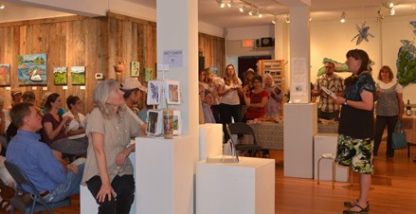
Shafted: A Mystery launch at the Smithers Art Gallery, Friday, Aug. 15, 2014
In his song, Well May the World Go, Pete Seeger says, “Find a part of the world that you really like and stick to it.” Sometimes it’s tempting to move south, to go back to the coast, to start somewhere completely new. But not last Friday evening when we gathered to celebrate the launch of my latest book, Shafted: A Mystery.
It was so warm, we opened every window and door in the art gallery. Forests to the south and east were on fire and the main highway was closed. People were stocking up on gas and groceries, worried about cell phone service and hydro lines.
When the back country is burning, setting out chairs for a book launch feels frivolous. As people walk out into the warm evening, the sky tinged with smoke, they are worried about the mountain goats living on the mountain that’s on fire, the cattle that graze in the bush, the travellers who can’t get home. We all know someone who’s fighting the spread of flames through the dead pines: dispatching, dropping fire retardant, struggling through the smoke, hauling hoses, cutting firebreaks. People are talking about it as they come in the door. A few drops of rain splatter the sidewalk and we all feel hopeful.
Friends are the first to arrive, bringing plates of beautiful snacks. Karen sets out cherry tarts made with her own cherries; Tonja has made amazing pinwheel sandwiches; Vigil has a dish of bruschetta; Kim brings cinnamon bread. Gail has food and flowers. Pat, as always, takes pictures. A bright punch fills a glass bowl and soon people are drinking and eating and visiting. Dorothy’s cello thrums deep notes below the voices.
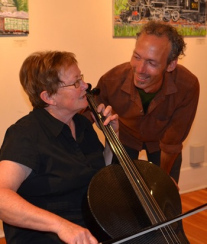
Dorothy Giesbrecht and Perry Rath
A book launch in a town where you’ve lived for years, a town where the novel you’re launching is set, and a town with gardens full of food and flowers, is a wonderful thing. I love the conversations with people as they bring me books to sign: some are close friends, some are acquaintances I’ve known since I moved here, some are people I haven’t talked to in years. Newcomers. Visitors.
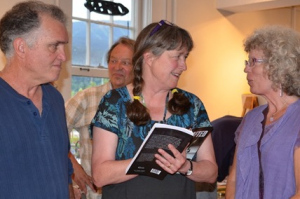
Peter Haines, Sheila, and Paulie Haines
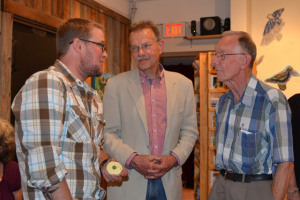
Mike Shervill, Richard Overstall and Harry Kruisselbrink
It’s wonderful to read aloud something you’ve written in solitude, to hear people fall silent, become attentive, enter into a story and laugh in recognition of a time, a place, a feeling that is home. It is wonderful to be able thank the people who helped bring the book together in a room filled with their friends and acquaintances.
But what goes deeper than that is the sound of a room full of people on a Friday evening telling each other their own stories, sharing their news, making plans, offering to help, making suggestions, hugging and laughing—in other words, doing many of the things that knit a community together.
Writers want their work to contain something of the universal, we want it to speak to people who don’t know us or where we live. But it is a great privilege to have created a sense of a place, a time, and people that in some small way reflect a community back to itself, a community you call home.
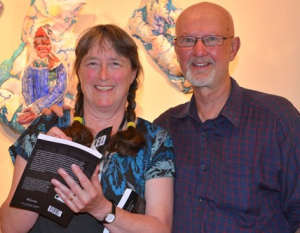
Sheila Peters and Lynn Shervill
We talk as we wash the glasses, sweep the floor and pack away the tables and chairs. These are good friends who have done worked together for years. In small towns, you have to create the events you want to attend. We have become skilled at this, we move in and out of groups that form and dissolve around issues, creative processes and political action, sometimes all at once. We ebb and flow with and among each other.
We consider ourselves lucky. We ‘ve found a place we love and we’re sticking with it.


July 23, 2014
Jan Zwicky – poet extraordinaire
Jan Zwicky has long been one of my favourite poets; when I found her poem, “Near”, in Brick magazine’s latest issue I asked if I could post it on my 

July 5, 2014
Oh, if only we could all sing together…
Kathaumixw is a Coast Salish word – a gathering together of different peoples – and is the name given to the international choral festival that has been held every other summer in Powell River on BC’s Sunshine Coast since 1984.
I grew up in Powell River and my mother still lives here, but this is only my second visit to the festival. My own United Church experience of choirs was pretty stodgy, though I do remember when Frank Bemrose sang O Holy Night at Christmas, shivers ran up my spine. It was his wife, my Grade Three teacher, who suggested I just move my lips when we sang at the Christmas concert. In spite of her, I used to lie in bed at night singing my heart out for the talent scout I knew was hiding in the closet so as not to make me anxious.
It wasn’t until I joined the Smithers community choir, Local Vocals, that I realized what powerful emotions are given expression in a choir. Mrs. Bemrose was right; I am not a strong singer. But surrounded by a cluster of talented altos who are very friendly about nudging me up or down the scale when necessary, I think I do okay. Well, mostly. There are days when it’s hard to batten down the jealousy I feel when those special voices ring out true and clear around me.
Kathaumixw is truly the perfect word – this festival is rich in musical differences. Each choir has its own personality: some are controlled, the singers barely moving, the voices the only projection coming from the group. They lean slightly forward, eyes on the conductor, attentive to every nuance of tone, tuning, blending and dynamics.
Other choirs are pure energy. They move and clap and laugh, visibly enjoy the sounds they are creating, the peculiar calls and responses the composer calls for, the clicking and whistling, the honking of small horns, the yodels and thunderstorms. These are not stodgy, these choirs, they are not stuffy. They can belt out an African-American spiritual, hollering and stamping. And somehow forty singers can hush down as quiet as a mother bending over a sleeping child.
But while I love to sing, I’m a writer. And however well a choir’s voices blend, you can find a Russian novel’s worth of characters standing side by side on the risers. As the music flows through them, you can see that big man on the left with the goofy hair is singing from some deep soulful place; the skinny little soprano who’s always smiling probably brings cookies to rehearsals. The middle-aged alto reaches out a hand to the baritone beside her. He steps closer to put an arm around her as the song reaches its crescendo. Afterward, he bends to her, she nods and steps away. Some crisis averted. Plot potential abounds.
The children’s choirs are miracles of diversity: one girl with dead straight black hair that sticks out like she’s taken part in a science centre’s high static demonstration; a little guy, can’t be more than six, has a dozen cowlicks, his exuberance barely contained. Beside him, a girl with tight pigtails stands apart, her mouth barely opening, the notes squeezed out through some powerful resistance. As a young women’s choir – a kind of finishing school for young ladies of the eastern seaboard – walks onto the stage, one girl sails out, large and calm, her hair bright pink, the only colour in the pall of ashen gowns and decorous hair.
As all these shapes, sizes and personalities sing, you can feel they are changed by the music and you know the music is changed by them. Some are struggling with technical difficulties, perhaps. Others might be reliving the heart-breaking memories of a winter’s night. When they belt out Hallelujah, one is maybe thinking how she’d like to kill the conductor for not giving her the solo. One is trying not to throw up from nerves or a hangover, one is pregnant, another has just miscarried, a grandfather has just heard that his daughter is leaving her husband and, for each one, the song tells a unique story.
As a writer, I find myself lost in their faces, their postures, their gestures and stances. With singers from Asia, Europe, Africa and New Zealand and North America, they literally encompass the world. There are a thousand unique characters that will gather tonight for the final massed choir singing of Oscar Peterson’s Hymn to Freedom and running through them all flows the great river of music. How could a writer not be jealous? How could a writer not be inspired?


January 1, 2014
Happy New Year, Glenwood Hall!
Sometimes the clouds hang low
muffling conversation between the rocks and sky.
It’s as if the mountains aren’t there,
as if we’re in some country or other
where the hills keep mumbling past,
the promise of mountains
never delivered.
They’re there though. They’re always
there and they’re not sleeping.
And that’s not grumbling
you hear. Under the wet blanket
they’re giggling. They’re planning
their next party. What colour
to wear. How much glitter to sprinkle
into their uncombed hair.
When the boyfriend came to visit all those years ago
they snickered at my disappointment. Waited
until he was gone to jump out from behind
the clouds and yell, surprise!
I laced up my dancing shoes and got right to it.
Last night those same mountains
dressed up in their tight white shirts
and packed themselves into the hall. Someone’s kids
played horns and belted out old soul standards –
Try a little tenderness
In the midnight hour
Chain of fools –
while we flung ourselves around, moonlight
sprinkled in our hair. For old timers,
we still dance pretty good.







